Erstellt am: 10. 9. 2012 - 14:13 Uhr
London Olympics 2012: A look backwards...
* admittedly much smaller and far, far less Evil
Over the last two-and-a-half years, you could say I've become a bit of journalistic dilettante for mega-sporting events, having gotten my feet wet at the Winter Olympics 2010 (in my home city of Vancouver), and then flown on to the FIFA World Cup in South Africa, and later the Gay Games* in Cologne, and, earlier this year, the Innsbruck Youth Olympic Games.
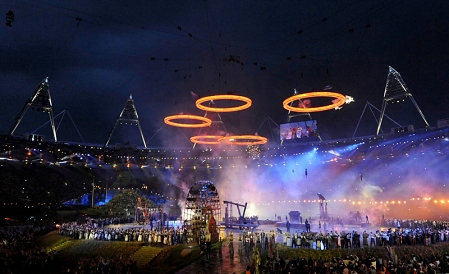
APA / Helmut Fohringer
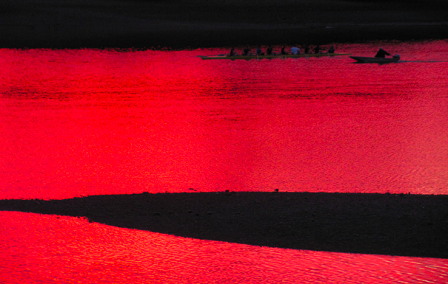
Johnny Bliss, 2012
* in 1908, and 1948
All of that said, the London Olympics this year were a quite different experience for me, for any number of reasons. These include my lack of journalistic accreditation (Fail.) and the simple fact that London, already being such a massive city with a history of hosting* Olympic Games, could cope so easily with hosting such a mega event, that you sometimes literally could forget that they were happening.
* 10 times smaller, to be exact, and requiring many fewer stadiums, etc.
Vancouver, during the duration of its much smaller* Winter Olympics, was swallowed by the Games. The public transportation was always crammed with Olympic traffic, and a significant portion of any crowd downtown included blue-coated volunteers, as well as other accredited hangers-on, with their giant photo passes hanging like ridiculously huge Flava Flav-esque clocks around their necks.
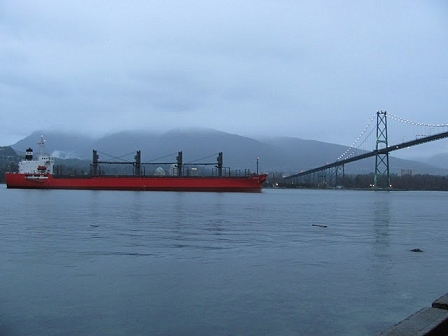
Johnny Bliss, 2010
Cape Town, for its part, buzzed with excitement and energy, and even if you could overlook that, the strong security presence in town at all times was impossible to ignore. (OK, World Cup is something different, but still.)
_body.jpg)
Johnny Bliss, 2010
London? The Tube was emptier than usual, owing to many locals avoiding it due to dire-sounding warnings that the Olympic traffic congestion would be hideous and result in horrific delays, as well as many dead kittens.
All of this failed to materialize, and the fact is: in years of visiting London City, I have never seen the city so quiet. During the Games, on occasion I would catch a train that had strong Olympic traffic, and it just reminded me of what the Tube was like, every single other time I'd ever been to London.
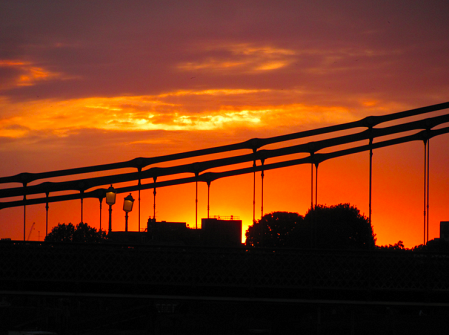
Johnny Bliss, 2012
It wasn't just the transit. London, being a behemoth of a city, requiring up to three or four hours of travel from one end to the next, with insane amounts of people and bustling action going on everywhere at all hours, every season - London, being London, simply absorbed the Olympics, and not only that, it did the seemingly impossible, doing the reverse of Vancouver and swallowing the Olympics whole, so you could carry on with your business for days in London and hardly even notice them.
Oh, sure, there were advertisements everywhere, and naturally you would sometimes see people clearly dressed in the Olympic get-up. But if you stayed away from the East London 'Ground Zero', London proved itself bigger, much bigger than any mega-event could ever hope to be.
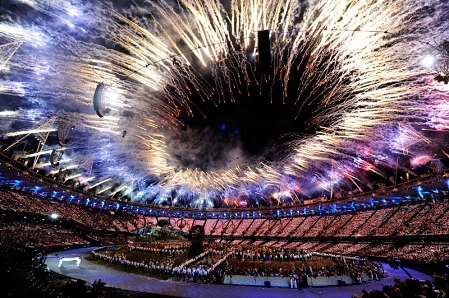
APA / Helmut Fohringer
This isn't to say that the darker legacy I have previously written about from other host cities - that of increased gentrification, housing evictions of the poor, high environmental footprint, permanent increase in the security apparatus, impact on free speech, and laws enforcing hawkish brand protection - have been a non-issue. Hardly. I spoke with activists here as well, and the usual problems were to be found in surplus - although a history of social housing in London appeared to reduce the negative effects on London's poor. Let's take a look at this.
* - an organization that describes itself as 'a network of people raising awareness about issues within the London Olympic development processes'...
First up was Martin Slavin, a photo-journalist working with gamesmonitor.org*. He met me one afternoon at his home in an impoverished area of East London, and we sat down to talk about the legacy of the Games on the people living there.
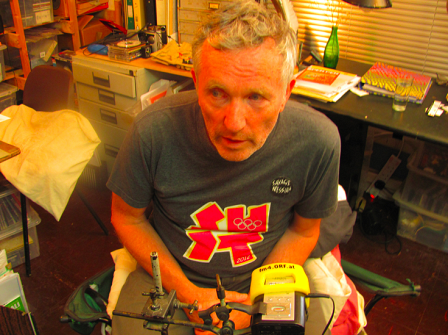
Johnny Bliss, 2012
The interview stretched over an hour and a half, but what I will include here is a short transcript of one of the more compelling topics we covered - specifically the effect of the Olympic 'brand protection' laws on free speech and the businesses of locals in the neighbourhood.
Martin: There is a large Greek-Cypriot population in this area, and one of the common names that Greek Cypriots use to advertise their shops, are Olympic Stores, or the Olympic Cafe. They've almost universally been told to take down that previous branding of their shops... there is one exactly around the corner from here, which used to be called Olympic Stores. They got visited by the 'brand police' about a year ago, so they took down part of their plastic fascia, because they couldn't afford to replace it completely. So they just took off the 'O' bit, so were then for a large amount of time the Lympic Stores. But recently, about a week before the Olympics, they were told to cover the whole thing up. So it's now not called anything, they've taken down their entire brand-fascia, which must have cost them quite a lot of money.

Johnny Bliss, 2012
That's one of the reasons why our website is called Games Monitor. The law says that you're not allowed to use two of a whole list of words together, like 'Games', 'Rings', 'Gold', 'Flame', stuff like that. You can't associate two of those words that are used in relation to the Olympics together. If you do, you will be deemed to have broken the branding laws, and they will come after you.
Hear this interview in today's Reality Check podcast (see below).
Also, see Rio On Watch
During my time in London, I also spoke with an activist named Theresa Williamson, from an organization in Rio de Janeiro called 'Catalytic Communities'. She specifically travelled to London to search for parallels, commonalities, and differences that can be found between Olympic host cities - to give her organization a sense also of what they could also expect in 2016 (and, to a certain extent, 2014) in Rio.
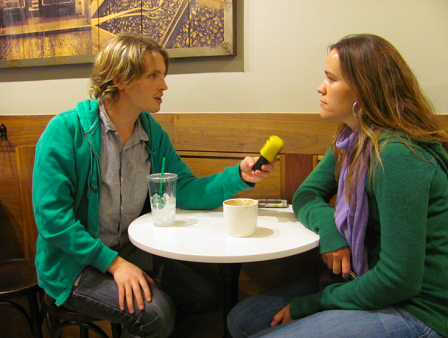
Johnny Bliss, 2012
Theresa: Housing is the big issue, really. London, like Rio, has a very expensive housing market. And so, as a result, lower-income people get priced out. In London's case, there's been a decrease in social housing, and there's been an increase in gentrification. The Olympics has encouraged that. In Rio's case, [...] unfortunately we don't have a good tradition at all of social housing, so our equivalent really is the informal settlements called the favelas, which is where 22% of Rio's population calls home. That's the solution that has been created historically in Brazil for lack of public housing in cities: communities organizing their own housing, essentially. So we're also seeing in Rio that people are being displaced because of the Olympics. So either forced evictions - as in Rio - or gentrification. But both of those things are happening.
What I would say I've learned clearly - and I can compare with Rio, for me it is a very visible similarity - is that in any Olympic city, the fact that you have X amount of years from the day that you're awarded the bid, to the day you have to fulfill it, pushes a city into a process that creates a state of exception, where normal local laws don't apply anymore. So you have this deadline, and you have to have all this infrastructure in by that deadline, regardless of whether you have public participation, regardless of whether you're going to find the resources, or if you have to take it out of some other pot. None of that kind of public consultation that's built into a city's policies, whether it's London, Rio... Beijing isn't a good example! But cities in Democratic countries, their laws that involve participation in democracy are almost put on hold, so an event like this can be pulled off.
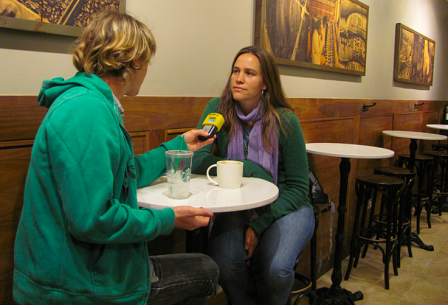
Johnny Bliss, 2012
So what we see is that the group in power takes advantage of that situation to fulfill their objectives, objectives that they may not have been able to fulfill, in a normal democratic political process. So the enclosed area of the Olympic Park here in London... There's no way without the Olympics that the developers would have had access to that whole site, to be able to essentially destroy everything there and rebuild from scratch. In Rio it's the same thing, without the Olympics, there's no way they would have had the opportunity, or excuse, whatever you want to call it, to develop whole areas of the city, because there would be other interests, there would be other stakeholders, etcetera.
I'd say the comparison that can be made, not only between Rio and London, but Vancouver, Beijing, Barcelona, is that whatever the governing group at the moment wants, gets facilitated, because all of a sudden you have this state of exception where existing laws don't have to be fulfilled, and you can kind of steam roll ahead with your plans.
Do you think that's why governments are so eager to host Olympics or a World Cup?
Yes. Because it doesn't make anyone any money in the long-term, and it doesn't really benefit the majority of residents of a city, so the only reason to host it, I would say, in addition to the state of exception that allows certain groups to benefit dramatically, [...] is maybe an ego-pride aspect, which, for example, in a country like South Africa or Brazil, that's kind of up and coming, wants to show that it can pull it off, and wants to be able to prove something to the world, so there may be that element as well.
Listen to some other parts of the interview here:
Funny. That reminds me of things that I heard earlier this year while interviewing activists in Vancouver.
--
Listen to interviews with Theresa Williamson (Catalytic Communities; Rio On Watch), Martin Slavin (Games Monitor; London), David Eby (BCCLA; Vancouver), and Greg Hamilton (World Olympic Watch; Vancouver) on today's FM4 Reality Check Podcast.
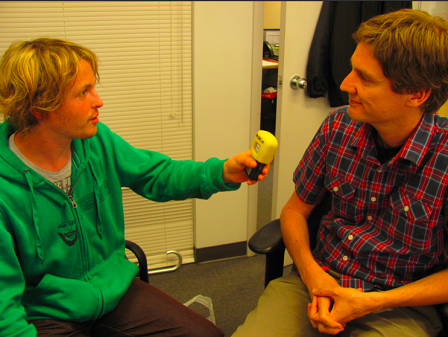
Johnny Bliss, 2012
Oh! I didn't just interview activists...
...I also interviewed a Super Hero who volunteered at the Olympics. Meet Super Cycling Man!

Super Cycling Man, 2012
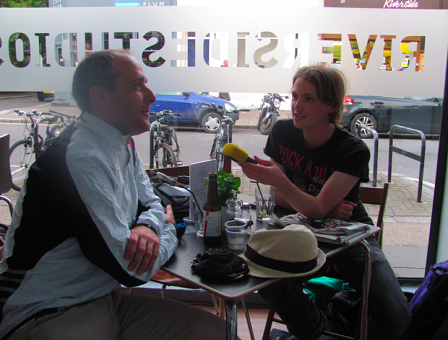
Johnny Bliss, 2012
Oh, and I interviewed an entire Olympic swimming team. OK, that meant a coach and a single swimmer. But still.
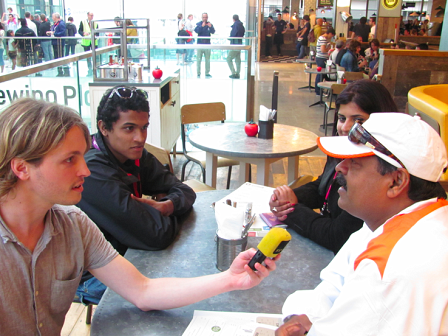
Johnny Bliss, 2012
Oh! And I interviewed a bunch of random people on the street too. We discussed the legacy, historical implications, and the Queen's opinion of the Olympics.
London 2012
BCCLA [Vancouver]
Vancouver 2010
Innsbruck 2012
Rio On Watch
Catalytic Communities
Gay Games
FIFA World Cup

Johnny Bliss, 2012
For more on these topics, please stay tuned for Russia and Brazil.


